定语从句精练100题(含答案) -2026届高三英语复习专项
文档属性
| 名称 | 定语从句精练100题(含答案) -2026届高三英语复习专项 | 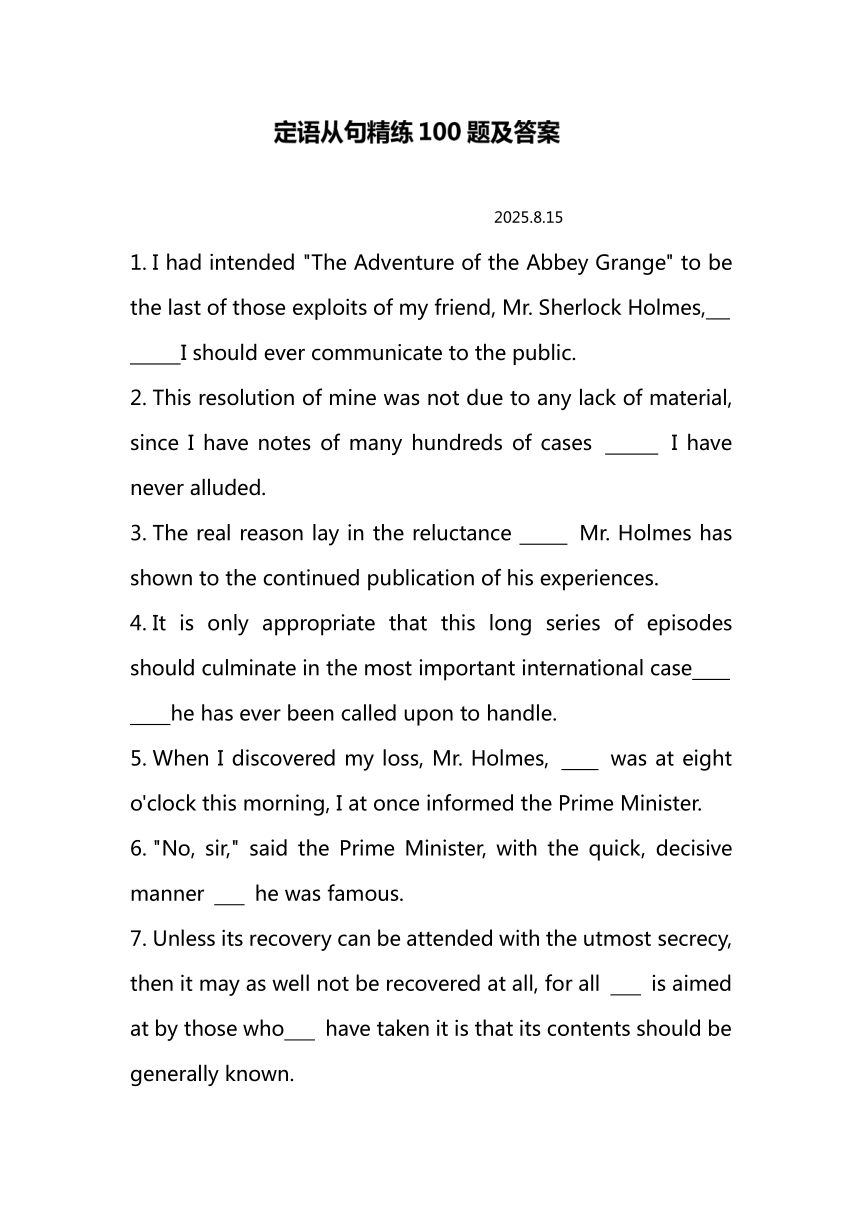 | |
| 格式 | docx | ||
| 文件大小 | 27.7KB | ||
| 资源类型 | 教案 | ||
| 版本资源 | 人教版(2019) | ||
| 科目 | 英语 | ||
| 更新时间 | 2025-08-18 11:54:21 | ||
图片预览

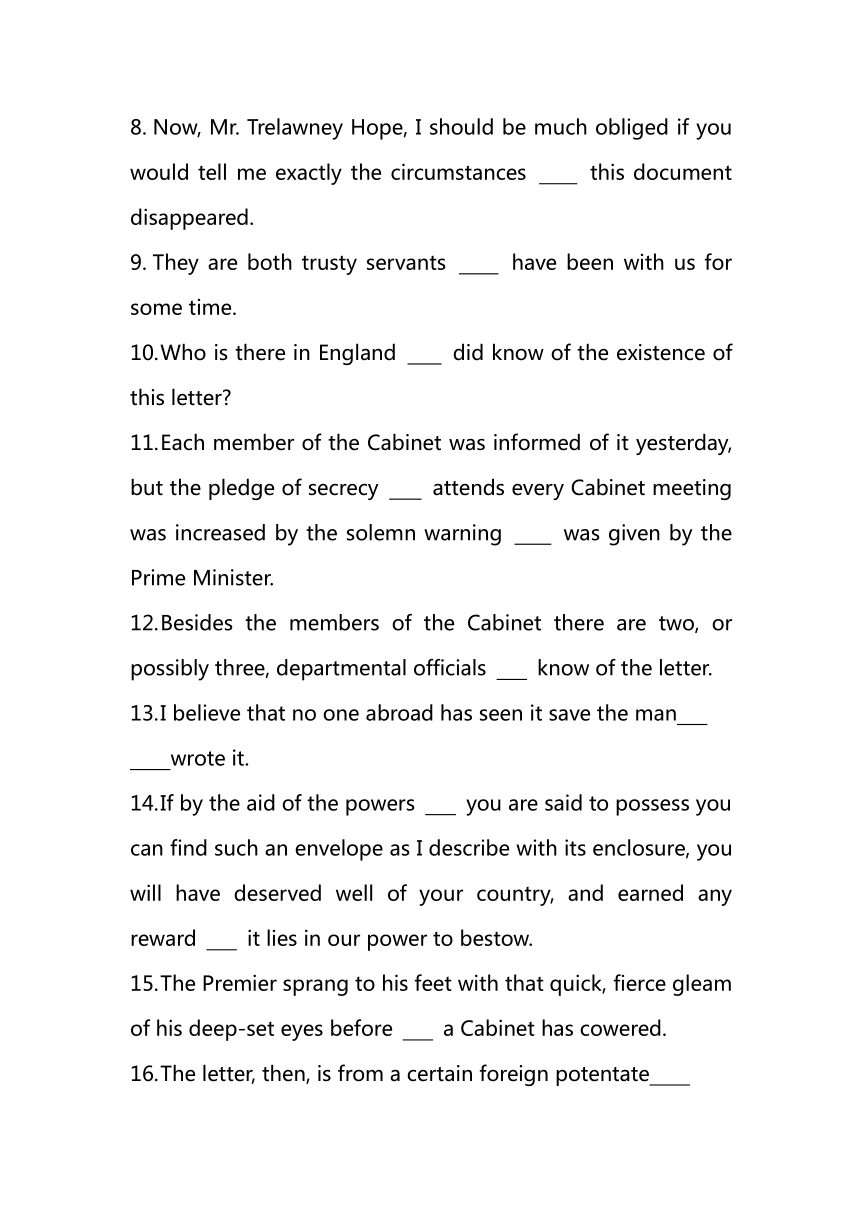
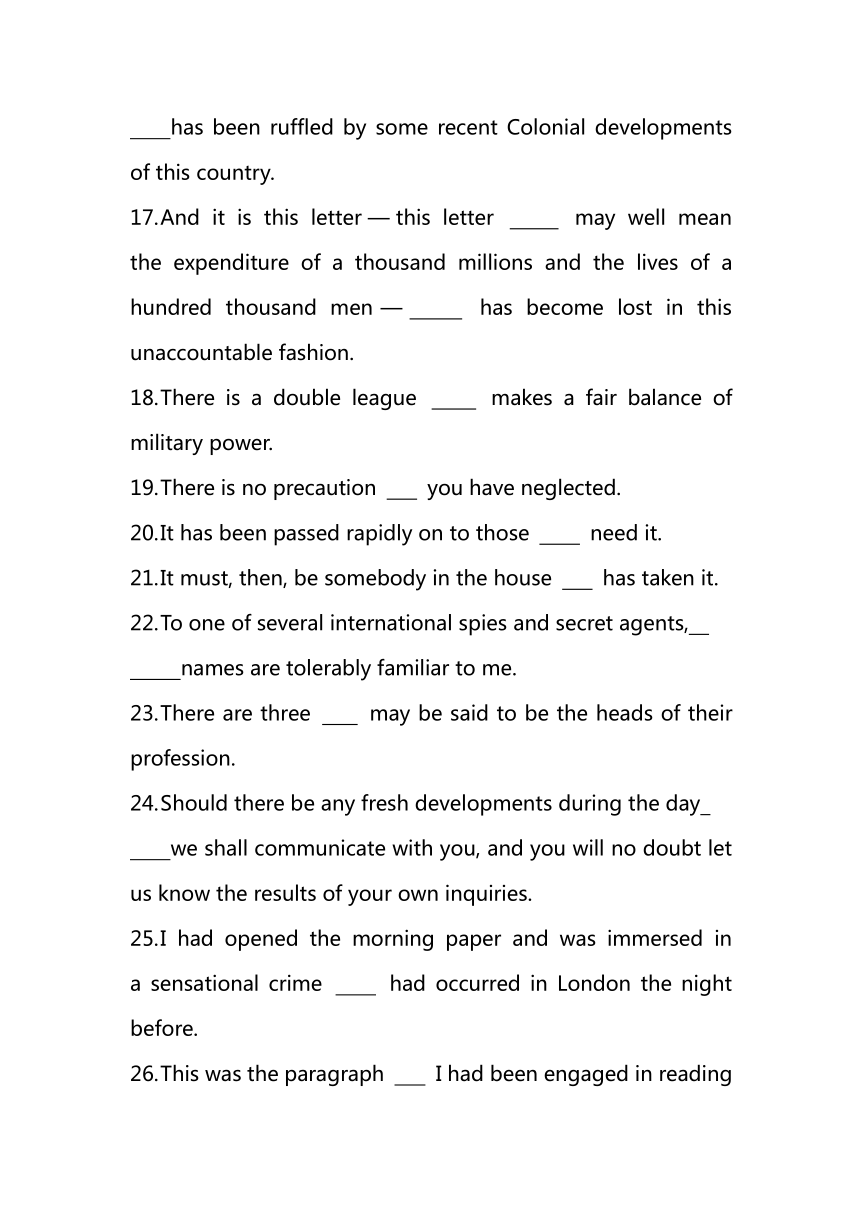
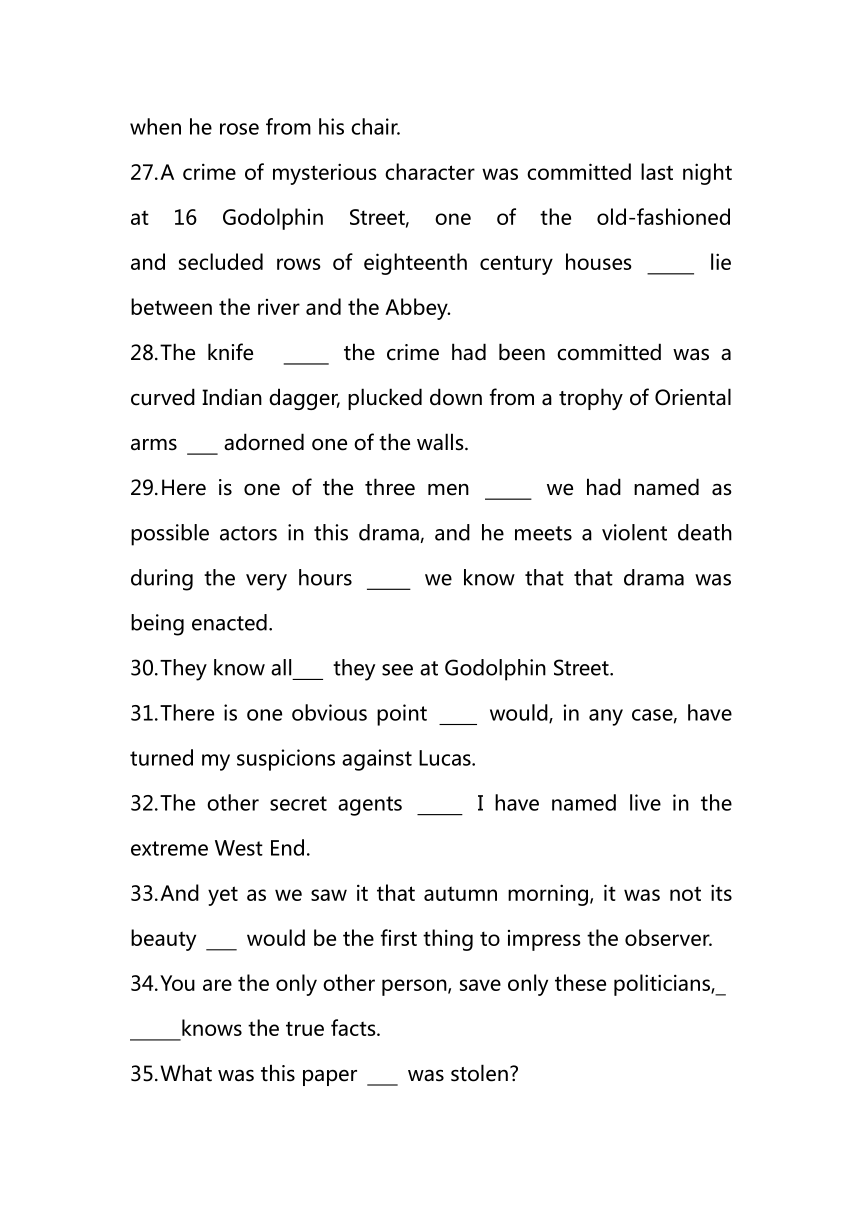
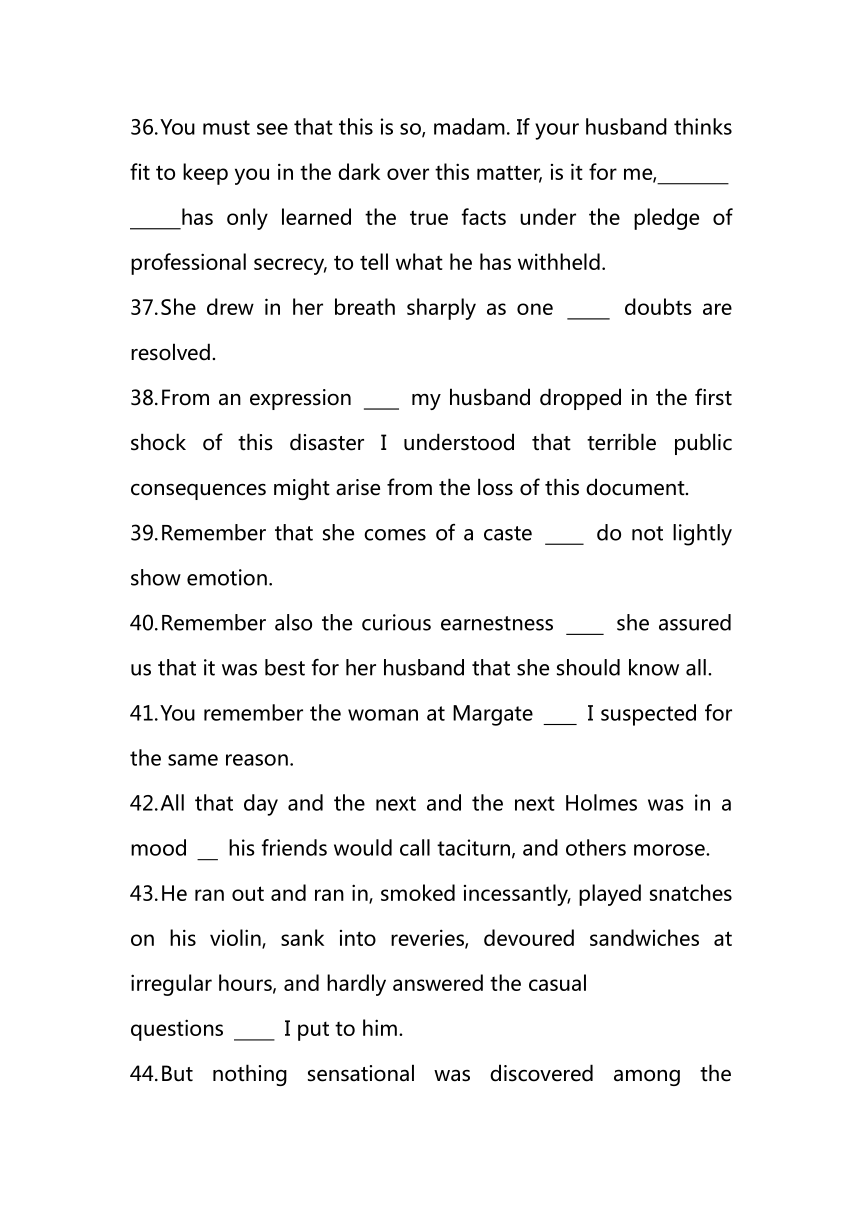
文档简介
2025.8.15
I had intended "The Adventure of the Abbey Grange" to be the last of those exploits of my friend, Mr. Sherlock Holmes,
I should ever communicate to the public.
This resolution of mine was not due to any lack of material, since I have notes of many hundreds of cases I have never alluded.
The real reason lay in the reluctance Mr. Holmes has shown to the continued publication of his experiences.
It is only appropriate that this long series of episodes should culminate in the most important international case
he has ever been called upon to handle.
When I discovered my loss, Mr. Holmes, was at eight o'clock this morning, I at once informed the Prime Minister.
"No, sir," said the Prime Minister, with the quick, decisive manner he was famous.
Unless its recovery can be attended with the utmost secrecy, then it may as well not be recovered at all, for all is aimed at by those who have taken it is that its contents should be generally known.
Now, Mr. Trelawney Hope, I should be much obliged if you would tell me exactly the circumstances this document disappeared.
They are both trusty servants have been with us for some time.
Who is there in England did know of the existence of this letter
Each member of the Cabinet was informed of it yesterday, but the pledge of secrecy attends every Cabinet meeting was increased by the solemn warning was given by the Prime Minister.
Besides the members of the Cabinet there are two, or possibly three, departmental officials know of the letter.
I believe that no one abroad has seen it save the man
wrote it.
If by the aid of the powers you are said to possess you can find such an envelope as I describe with its enclosure, you will have deserved well of your country, and earned any reward it lies in our power to bestow.
The Premier sprang to his feet with that quick, fierce gleam of his deep-set eyes before a Cabinet has cowered.
The letter, then, is from a certain foreign potentate
has been ruffled by some recent Colonial developments of this country.
And it is this letter—this letter may well mean the expenditure of a thousand millions and the lives of a hundred thousand men— has become lost in this unaccountable fashion.
There is a double league makes a fair balance of military power.
There is no precaution you have neglected.
It has been passed rapidly on to those need it.
It must, then, be somebody in the house has taken it.
To one of several international spies and secret agents,
names are tolerably familiar to me.
There are three may be said to be the heads of their profession.
Should there be any fresh developments during the day
we shall communicate with you, and you will no doubt let us know the results of your own inquiries.
I had opened the morning paper and was immersed in a sensational crime had occurred in London the night before.
This was the paragraph I had been engaged in reading when he rose from his chair.
A crime of mysterious character was committed last night at 16 Godolphin Street, one of the old-fashioned and secluded rows of eighteenth century houses lie between the river and the Abbey.
The knife the crime had been committed was a curved Indian dagger, plucked down from a trophy of Oriental arms adorned one of the walls.
Here is one of the three men we had named as possible actors in this drama, and he meets a violent death during the very hours we know that that drama was being enacted.
They know all they see at Godolphin Street.
There is one obvious point would, in any case, have turned my suspicions against Lucas.
The other secret agents I have named live in the extreme West End.
And yet as we saw it that autumn morning, it was not its beauty would be the first thing to impress the observer.
You are the only other person, save only these politicians,
knows the true facts.
What was this paper was stolen
You must see that this is so, madam. If your husband thinks fit to keep you in the dark over this matter, is it for me,
has only learned the true facts under the pledge of professional secrecy, to tell what he has withheld.
She drew in her breath sharply as one doubts are resolved.
From an expression my husband dropped in the first shock of this disaster I understood that terrible public consequences might arise from the loss of this document.
Remember that she comes of a caste do not lightly show emotion.
Remember also the curious earnestness she assured us that it was best for her husband that she should know all.
You remember the woman at Margate I suspected for the same reason.
All that day and the next and the next Holmes was in a mood his friends would call taciturn, and others morose.
He ran out and ran in, smoked incessantly, played snatches on his violin, sank into reveries, devoured sandwiches at irregular hours, and hardly answered the casual
questions I put to him.
But nothing sensational was discovered among the documents filled his drawers.
He had many acquaintances among them, but few friends, and no one he loved.
It is true that he started home at an hour should have brought him to Westminster before the time the crime was discovered, but his own explanation that he had walked part of the way seemed probable enough in view of the fineness of the night.
Upon the fourth day there appeared the longest telegram from Paris seemed to solve the whole question.
A discovery has just been made by the Parisian
police raises the veil hung round the tragic fate of Mr. Eduardo Lucas, met his death by violence last Monday night at Godolphin Street, Westminster.
Yesterday a lady, has been known as Mme. Henri Fournaye, occupying a small villa in the Rue Austerlitz, was reported to the authorities by her servants as being insane.
Mme. Fournaye, is of Creole origin, is of an extremely excitable nature, and has suffered in the past from attacks of jealousy have amounted to frenzy.
It is conjectured that it was in one of these that she committed the terrible crime has caused such a sensation in London.
There is evidence that a woman, might have been Mme. Fournaye, was seen for some hours upon Monday night watching the house in Godolphin Street.
The man's death is a mere incident—a trivial episode—in comparison with our real task, is to trace this document and save a European catastrophe.
That's the very question beats in my brain like a hammer.
It is a case, my dear Watson, the law is as dangerous to us as the criminals are.
He glanced hurriedly at the note had been handed in.
It was my first visit to the scene of the crime—a high, dingy, narrow-chested house, prim, formal, and solid, like the century
gave it birth.
The room we were shown was that the crime had been committed, but no trace of it now remained save an ugly, irregular stain upon the carpet.
Over the fireplace was a magnificent trophy of weapons, one had been used on that tragic night.
In the window was a sumptuous writing-desk, and every detail of the apartment, the pictures, the rugs, and the hangings, all pointed to a taste was luxurious to the verge of effeminacy.
Ah, yes, that's another matter—a mere trifle, but the sort of thing you take an interest in—queer, you know, and what you might call freakish.
I know of your visit to Eduardo Lucas, of your giving him this document, of your ingenious return to the room last night, and of the manner you took the letter from the hiding-place under the carpet.
There is no woman in all London loves her husband as I do, and yet if he knew how I have acted—how I have been compelled to act—he would never forgive me.
He said that he would return my letter if I would bring him a certain document he described in my husband's despatch-box.
He had some spy in the office had told him of its existence.
I have a vision of a dark, frantic face, of a woman's voice,
screamed in French, my waiting is not in vain.
These three were the first saw the strange, sad face of the boy, , when he grew to be a man, was so great and good and did such grand deeds that all the world gave most high praise to him.
The folks the father came were first known in America in 1618.
All the long line of men this babe came bore Bible names.
Near their farm was that of George Boone had come from England with eleven children.
The Lincolns went into the valley of the Shenandoah and took up tracts on lands had been surveyed by George Washington.
Boone got up a band of two score and ten men in 1775 and made a settlement at a spot he gave the name of Boonsborough, in what is now Kentucky.
When the war of the Revolution came, the Indians had arms and shot had been given to them by the British.
The red men fought hard for the lands they were wont to hunt.
The end of their route was near Beargrass Fort, was not far from what is now the city of Louisville, Kentucky.
When he was a man grown he wed Nancy Hanks, made a good and true wife for him.
As he learned to talk, his mother hid his sayings in her heart, telling but few friends, were near her, how she felt about that son.
As the boy, Abraham, grew in strength and health, his eyes turned to his mother for all made life dear.
The truths the mother gave out sank deep in the heart of her boy, and in due time they put forth shoots grew to a great size, and were of use to the world.
Thomas Lincoln had been a man would stay in one place, and work the soil year in and year out.
A loghouse had been built there, and a man found name was Rev. David Elkins, and who was glad to come a long way through the woods to preach from the Word of God.
Ere long one came, said he could teach all the folks to spell and read.
He said it would suit him to move to the West, rich soil and more game could be found.
In a few days the waters, had come up as high as the banks, went down, and folks along shore helped him get up a few of his goods from the bottom of the river.
These goods he put into a new boat, he said he would pay for as soon as he could, and then floated down the Ohio to Thompson’s Landing.
The cool days of November had come ere wife and children, with two horses a friend had loaned, and what goods were left, set out for the far off land of Indiana.
But at last they came to the banks of one stream they could look far off to the land they were to make their new home.
The lad slept in a small loft at one end of the cabin he went up by means of pegs in the wall.
The grief came then to Abraham Lincoln made its mark on him, a stamp went with him through life.
When that mother died, that dear mother, he gave so much love, the boy felt that he did not want to live any longer.
It was great grief to young Abraham that the good man of God spoke in the old home was not there to say some words at that time.
Good Par-son Elkins took the poor note sent from the boy
he loved, and, with his heart full of pity for the greatest grief had come to his old friends.
Because of his deep regard for the noble woman had gone to her rest, he made the long journey, though weeks passed ere he could stand by that grave and say the very words Abraham longed to hear.
One day some one told Abraham that Mr. Crawford, a man
home was miles off, had the best book he ought to read.
They took a glance at some boats they found there, chose Lincoln’s boat, and asked him if he would take men and trunks out to the steam-er.
A man kept a store thought he would send a“cargo load,”bacon, corn meal, and other goods, down to New Or-leans in a large flatboat.
The very words they heard were in the only tongue
they did not know.
Men were there sailed far over the seas in search of gold, rich goods, sights of places, tribes and climes to which Lincoln had not giv-en much thought.
He had come to an age there was unrest.
100.He must make a quick move if he would save those
were left.
定语从句精练100题答案
1.that 2.to which 3.that/which 4.that
5.which 6.for which 7.that;who
8.under which 9.who/that 10.that
11.which/that;which/that 12.who/that
13.who/that 14.which/that;which 15.which/that
16.who/that 17.which/that;which 18.which/that
19.which/that 20.who 21.who 22.whose
23.who/that 24.that 25.which/that
26.which/that 27.which/that
28.with which; which/that 29. that/who/whom;when
30.that 31.which/that 32.whom/who/that
33.which/that 34.who 35.which/that 36.who
37.whose 38.which/that 39.who/that
40.with which 41.whom/who/that
42.which/that 43.which/that 44.which/that
45.whom/who 46.which/that;when 47.that
48.which/that;which/that;who 49.who
50.who;which/that 51.which/that 52.who
53.which 54.that 55.where 56.which/that
57.which/that 58.which/that;in which
59.of which 60.which/that 61.that/which
62. in which 63.who/that 64.which/that 65.who/that
66.which 67.who;who 68.from whom 69.from whom
70.who/that 71.which/that 72.to which73.which/that
74.where 75.which 76.who 77.who 78.that
79.which/that 80.who/that 81.whose 82.who
83.where 84.which 85.which 86. which/that
87. from which;where 88.to which
89.that/which;that/which 90.towhom 91.who
92.that/who/whom;that 93.who/that;that
94.whose;that 95.that 96.who/that 97.that ;that
98.who/that 99.in which 100.who
I had intended "The Adventure of the Abbey Grange" to be the last of those exploits of my friend, Mr. Sherlock Holmes,
I should ever communicate to the public.
This resolution of mine was not due to any lack of material, since I have notes of many hundreds of cases I have never alluded.
The real reason lay in the reluctance Mr. Holmes has shown to the continued publication of his experiences.
It is only appropriate that this long series of episodes should culminate in the most important international case
he has ever been called upon to handle.
When I discovered my loss, Mr. Holmes, was at eight o'clock this morning, I at once informed the Prime Minister.
"No, sir," said the Prime Minister, with the quick, decisive manner he was famous.
Unless its recovery can be attended with the utmost secrecy, then it may as well not be recovered at all, for all is aimed at by those who have taken it is that its contents should be generally known.
Now, Mr. Trelawney Hope, I should be much obliged if you would tell me exactly the circumstances this document disappeared.
They are both trusty servants have been with us for some time.
Who is there in England did know of the existence of this letter
Each member of the Cabinet was informed of it yesterday, but the pledge of secrecy attends every Cabinet meeting was increased by the solemn warning was given by the Prime Minister.
Besides the members of the Cabinet there are two, or possibly three, departmental officials know of the letter.
I believe that no one abroad has seen it save the man
wrote it.
If by the aid of the powers you are said to possess you can find such an envelope as I describe with its enclosure, you will have deserved well of your country, and earned any reward it lies in our power to bestow.
The Premier sprang to his feet with that quick, fierce gleam of his deep-set eyes before a Cabinet has cowered.
The letter, then, is from a certain foreign potentate
has been ruffled by some recent Colonial developments of this country.
And it is this letter—this letter may well mean the expenditure of a thousand millions and the lives of a hundred thousand men— has become lost in this unaccountable fashion.
There is a double league makes a fair balance of military power.
There is no precaution you have neglected.
It has been passed rapidly on to those need it.
It must, then, be somebody in the house has taken it.
To one of several international spies and secret agents,
names are tolerably familiar to me.
There are three may be said to be the heads of their profession.
Should there be any fresh developments during the day
we shall communicate with you, and you will no doubt let us know the results of your own inquiries.
I had opened the morning paper and was immersed in a sensational crime had occurred in London the night before.
This was the paragraph I had been engaged in reading when he rose from his chair.
A crime of mysterious character was committed last night at 16 Godolphin Street, one of the old-fashioned and secluded rows of eighteenth century houses lie between the river and the Abbey.
The knife the crime had been committed was a curved Indian dagger, plucked down from a trophy of Oriental arms adorned one of the walls.
Here is one of the three men we had named as possible actors in this drama, and he meets a violent death during the very hours we know that that drama was being enacted.
They know all they see at Godolphin Street.
There is one obvious point would, in any case, have turned my suspicions against Lucas.
The other secret agents I have named live in the extreme West End.
And yet as we saw it that autumn morning, it was not its beauty would be the first thing to impress the observer.
You are the only other person, save only these politicians,
knows the true facts.
What was this paper was stolen
You must see that this is so, madam. If your husband thinks fit to keep you in the dark over this matter, is it for me,
has only learned the true facts under the pledge of professional secrecy, to tell what he has withheld.
She drew in her breath sharply as one doubts are resolved.
From an expression my husband dropped in the first shock of this disaster I understood that terrible public consequences might arise from the loss of this document.
Remember that she comes of a caste do not lightly show emotion.
Remember also the curious earnestness she assured us that it was best for her husband that she should know all.
You remember the woman at Margate I suspected for the same reason.
All that day and the next and the next Holmes was in a mood his friends would call taciturn, and others morose.
He ran out and ran in, smoked incessantly, played snatches on his violin, sank into reveries, devoured sandwiches at irregular hours, and hardly answered the casual
questions I put to him.
But nothing sensational was discovered among the documents filled his drawers.
He had many acquaintances among them, but few friends, and no one he loved.
It is true that he started home at an hour should have brought him to Westminster before the time the crime was discovered, but his own explanation that he had walked part of the way seemed probable enough in view of the fineness of the night.
Upon the fourth day there appeared the longest telegram from Paris seemed to solve the whole question.
A discovery has just been made by the Parisian
police raises the veil hung round the tragic fate of Mr. Eduardo Lucas, met his death by violence last Monday night at Godolphin Street, Westminster.
Yesterday a lady, has been known as Mme. Henri Fournaye, occupying a small villa in the Rue Austerlitz, was reported to the authorities by her servants as being insane.
Mme. Fournaye, is of Creole origin, is of an extremely excitable nature, and has suffered in the past from attacks of jealousy have amounted to frenzy.
It is conjectured that it was in one of these that she committed the terrible crime has caused such a sensation in London.
There is evidence that a woman, might have been Mme. Fournaye, was seen for some hours upon Monday night watching the house in Godolphin Street.
The man's death is a mere incident—a trivial episode—in comparison with our real task, is to trace this document and save a European catastrophe.
That's the very question beats in my brain like a hammer.
It is a case, my dear Watson, the law is as dangerous to us as the criminals are.
He glanced hurriedly at the note had been handed in.
It was my first visit to the scene of the crime—a high, dingy, narrow-chested house, prim, formal, and solid, like the century
gave it birth.
The room we were shown was that the crime had been committed, but no trace of it now remained save an ugly, irregular stain upon the carpet.
Over the fireplace was a magnificent trophy of weapons, one had been used on that tragic night.
In the window was a sumptuous writing-desk, and every detail of the apartment, the pictures, the rugs, and the hangings, all pointed to a taste was luxurious to the verge of effeminacy.
Ah, yes, that's another matter—a mere trifle, but the sort of thing you take an interest in—queer, you know, and what you might call freakish.
I know of your visit to Eduardo Lucas, of your giving him this document, of your ingenious return to the room last night, and of the manner you took the letter from the hiding-place under the carpet.
There is no woman in all London loves her husband as I do, and yet if he knew how I have acted—how I have been compelled to act—he would never forgive me.
He said that he would return my letter if I would bring him a certain document he described in my husband's despatch-box.
He had some spy in the office had told him of its existence.
I have a vision of a dark, frantic face, of a woman's voice,
screamed in French, my waiting is not in vain.
These three were the first saw the strange, sad face of the boy, , when he grew to be a man, was so great and good and did such grand deeds that all the world gave most high praise to him.
The folks the father came were first known in America in 1618.
All the long line of men this babe came bore Bible names.
Near their farm was that of George Boone had come from England with eleven children.
The Lincolns went into the valley of the Shenandoah and took up tracts on lands had been surveyed by George Washington.
Boone got up a band of two score and ten men in 1775 and made a settlement at a spot he gave the name of Boonsborough, in what is now Kentucky.
When the war of the Revolution came, the Indians had arms and shot had been given to them by the British.
The red men fought hard for the lands they were wont to hunt.
The end of their route was near Beargrass Fort, was not far from what is now the city of Louisville, Kentucky.
When he was a man grown he wed Nancy Hanks, made a good and true wife for him.
As he learned to talk, his mother hid his sayings in her heart, telling but few friends, were near her, how she felt about that son.
As the boy, Abraham, grew in strength and health, his eyes turned to his mother for all made life dear.
The truths the mother gave out sank deep in the heart of her boy, and in due time they put forth shoots grew to a great size, and were of use to the world.
Thomas Lincoln had been a man would stay in one place, and work the soil year in and year out.
A loghouse had been built there, and a man found name was Rev. David Elkins, and who was glad to come a long way through the woods to preach from the Word of God.
Ere long one came, said he could teach all the folks to spell and read.
He said it would suit him to move to the West, rich soil and more game could be found.
In a few days the waters, had come up as high as the banks, went down, and folks along shore helped him get up a few of his goods from the bottom of the river.
These goods he put into a new boat, he said he would pay for as soon as he could, and then floated down the Ohio to Thompson’s Landing.
The cool days of November had come ere wife and children, with two horses a friend had loaned, and what goods were left, set out for the far off land of Indiana.
But at last they came to the banks of one stream they could look far off to the land they were to make their new home.
The lad slept in a small loft at one end of the cabin he went up by means of pegs in the wall.
The grief came then to Abraham Lincoln made its mark on him, a stamp went with him through life.
When that mother died, that dear mother, he gave so much love, the boy felt that he did not want to live any longer.
It was great grief to young Abraham that the good man of God spoke in the old home was not there to say some words at that time.
Good Par-son Elkins took the poor note sent from the boy
he loved, and, with his heart full of pity for the greatest grief had come to his old friends.
Because of his deep regard for the noble woman had gone to her rest, he made the long journey, though weeks passed ere he could stand by that grave and say the very words Abraham longed to hear.
One day some one told Abraham that Mr. Crawford, a man
home was miles off, had the best book he ought to read.
They took a glance at some boats they found there, chose Lincoln’s boat, and asked him if he would take men and trunks out to the steam-er.
A man kept a store thought he would send a“cargo load,”bacon, corn meal, and other goods, down to New Or-leans in a large flatboat.
The very words they heard were in the only tongue
they did not know.
Men were there sailed far over the seas in search of gold, rich goods, sights of places, tribes and climes to which Lincoln had not giv-en much thought.
He had come to an age there was unrest.
100.He must make a quick move if he would save those
were left.
定语从句精练100题答案
1.that 2.to which 3.that/which 4.that
5.which 6.for which 7.that;who
8.under which 9.who/that 10.that
11.which/that;which/that 12.who/that
13.who/that 14.which/that;which 15.which/that
16.who/that 17.which/that;which 18.which/that
19.which/that 20.who 21.who 22.whose
23.who/that 24.that 25.which/that
26.which/that 27.which/that
28.with which; which/that 29. that/who/whom;when
30.that 31.which/that 32.whom/who/that
33.which/that 34.who 35.which/that 36.who
37.whose 38.which/that 39.who/that
40.with which 41.whom/who/that
42.which/that 43.which/that 44.which/that
45.whom/who 46.which/that;when 47.that
48.which/that;which/that;who 49.who
50.who;which/that 51.which/that 52.who
53.which 54.that 55.where 56.which/that
57.which/that 58.which/that;in which
59.of which 60.which/that 61.that/which
62. in which 63.who/that 64.which/that 65.who/that
66.which 67.who;who 68.from whom 69.from whom
70.who/that 71.which/that 72.to which73.which/that
74.where 75.which 76.who 77.who 78.that
79.which/that 80.who/that 81.whose 82.who
83.where 84.which 85.which 86. which/that
87. from which;where 88.to which
89.that/which;that/which 90.towhom 91.who
92.that/who/whom;that 93.who/that;that
94.whose;that 95.that 96.who/that 97.that ;that
98.who/that 99.in which 100.who
